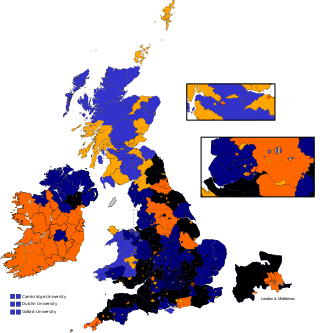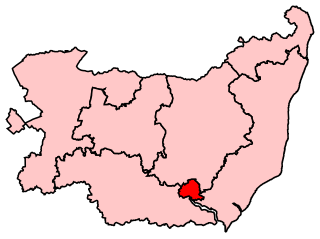
The Duchy of Lancaster is a private estate of the British sovereign. The estate has its origins in the lands held by the medieval Dukes of Lancaster, which came under the direct control of the monarch when Henry Bolingbroke, the then duke of Lancaster, ascended the throne in 1399. In 1461 King Edward IV confirmed that the duchy would be inherited by the monarch, but held separately from the Crown Estate, the other assets which belong to the monarch.

Hugh Culling Eardley Childers was a British Liberal statesman of the nineteenth century. He is perhaps best known for his reform efforts at the Admiralty and the War Office. Later in his career, as Chancellor of the Exchequer, his attempt to correct a budget shortfall led to the fall of the Liberal government led by William Gladstone.

The secret ballot, also known as the Australian ballot, is a voting method in which a voter's identity in an election or a referendum is anonymous. This forestalls attempts to influence the voter by intimidation, blackmailing, and potential vote buying. This system is one means of achieving the goal of political privacy.
A ballot box is a temporarily sealed container, usually a square box though sometimes a tamper resistant bag, with a narrow slot in the top sufficient to accept a ballot paper in an election but which prevents anyone from accessing the votes cast until the close of the voting period. A ballot drop box allows voters who have received a ballot by mail to submit it for counting in a self-service fashion.

East Gloucestershire, formally the Eastern division of Gloucestershire and often referred to as Gloucestershire Eastern, was a parliamentary constituency in Gloucestershire, represented in the House of Commons of the Parliament of the United Kingdom. It elected two Members of Parliament (MPs) using the bloc vote system.

The Ballot Act 1872 was an Act of the Parliament of the United Kingdom that introduced the requirement for parliamentary and local government elections in the United Kingdom to be held by secret ballot. The act abolished the traditional hustings system of nomination and election in Britain.

Clitheroe was a parliamentary constituency in Lancashire.

West Gloucestershire was a parliamentary constituency in Gloucestershire, represented in the House of Commons of the Parliament of the United Kingdom.
Pontefract was an English parliamentary constituency centred on the town of Pontefract in the West Riding of Yorkshire, which returned two Members of Parliament to the House of Commons briefly in the 13th century and again from 1621 until 1885, and one member from 1885 to 1974.
The 1963 Labour Party leadership election was held following the death of Hugh Gaitskell, party leader since 1955. He died on 18 January 1963 and was succeeded by deputy leader George Brown.
Portsmouth was a borough constituency based upon the borough of Portsmouth in Hampshire. It returned two members of parliament (MPs) to the House of Commons of the Parliament of the United Kingdom, elected by the bloc vote system.
Stockbridge was a parliamentary borough in Hampshire, which elected two Members of Parliament (MPs) to the House of Commons from 1563 until 1832, when the borough was abolished by the Great Reform Act. It was one of the more egregiously rotten boroughs, and the first to have its status threatened for its corruption by a parliamentary bill to disfranchise it, though the proposal was defeated.
The January 1918 Prestwich by-election was a by-election held on 31 January 1918 for the British House of Commons constituency of Prestwich in Lancashire.

There are five types of elections in the United Kingdom: elections to the House of Commons of the United Kingdom, elections to devolved parliaments and assemblies, local elections, mayoral elections, and Police and Crime Commissioner elections. Within each of those categories, there may also be by-elections. Elections are held on Election Day, which is conventionally a Thursday, and under the provisions of the Dissolution and Calling of Parliament Act 2022 the timing of general elections can be held at the discretion of the prime minister during any five-year period. All other types of elections are held after fixed periods, though early elections to the devolved assemblies and parliaments can occur in certain situations. The five electoral systems used are: the single member plurality system (first-past-the-post), the multi-member plurality, the single transferable vote, the additional member system, and the supplementary vote.

The Ipswich by-election was a Parliamentary by-election held on 23 May 1914. The constituency returned two Members of Parliament (MP) to the House of Commons of the United Kingdom, elected by the first past the post voting system.

The Bethnal Green South West by-election was a Parliamentary by-election held on 19 February 1914. The constituency returned one Member of Parliament (MP) to the House of Commons of the United Kingdom, elected by the first past the post voting system.
The Edinburgh South by-elections were two parliamentary by-elections held for the House of Commons constituency of Edinburgh South in the Scottish capital on
The Londonderry City by-election of 1872 was held on 23 November following the resignation of incumbent Liberal Party member of parliament Richard Dowse to become a Baron of the Exchequer. The Liberal vote was split as their candidate, Christopher Palles, was considered by Catholics as a "priest-hunter" for his prosecution of clergy as Attorney-General and denounced by Protestants for his views on education along denominational lines. The election was won by the Irish Conservative Party's Charles Lewis who secured a 174-vote majority. The election was the first Irish election to the British Parliament to be held by secret ballot.
The 1854 Frome by-election was a parliamentary by-election held in England on 24 October 1854 for the House of Commons constituency of Frome, a parliamentary borough in Somerset.

The Old Town Hall is a historic town hall in Market Place in Pontefract, West Yorkshire, England. It was completed in 1785 and was replaced by Pontefract Town Hall which was completed in 1882. It was designated a Grade II* listed building in 1950.











